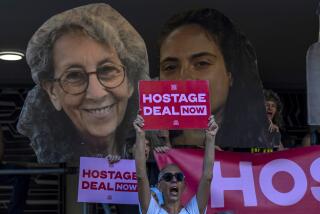Salvador Cease-Fire Called Unlikely : Central America: It ‘can’t be done,’ U.N. mediator says. He cites impasse on the issue of rebel security.
SAN SALVADOR — Refusal by both sides to budge on the question of guaranteeing rebel security after an end to El Salvador’s 11-year civil war “closes the circle” on negotiations and means a cease-fire “can’t be done,” according to Alvaro de Soto, the U.N. mediator in the peace talks.
Speaking to two American reporters in a telephone interview from his home in Connecticut, De Soto said the problem “is the question of what conditions and guarantees are necessary to convince these chaps (the rebels) to reintegrate into society.
“Unless you look at guarantees and conditions, for the FMLN the cease-fire will be like asking them to jump into an empty swimming pool. For this reason, the FMLN (the Spanish initials for the rebel Farabundo Marti National Liberation Front) is asking for cease-fire terms that are tantamount to an armed peace,” he added.
“They want to be able to carry out maneuvers and continue to recruit in a large swatch of the country to be ready for the possibility of having to return to fighting. For the government, that is unthinkable,” the U.N. official said.
Although they have changed the wording and modified the form, a constant FMLN demand over the 16 months of peace talks has been to reform the government’s armed forces to include elements of the rebel army, a demand flatly rejected by President Alfredo Cristiani.
FMLN officials nevertheless renewed that demand last week in a meeting with De Soto in Costa Rica, calling for a union of the two armies.
De Soto’s assessment of the official Salvadoran view was confirmed by President Cristiani, who said in a separate interview that the “Gordian knot” blocking a cease-fire is the FMLN demand that its security be guaranteed by incorporating its guerrilla fighters into the country’s security forces.
“That is basically the main issue in generating obstacles right now,” he said during a conversation in his office. This is not only impractical, Cristiani said, “this will only generate problems,” an apparent reference to army opposition to leaving the FMLN with any military capability.
Speaking softly but in hard terms, Cristiani appeared to believe he has the upper hand in dealing with the guerrillas, who he said are torn by dissension.
Arguing that the rebels have no right to ask economic or political reforms of an elected government, Cristiani indicated that there really is nothing to negotiate other than the laying down of rebel arms.
“The main objective here is to create a disarmed political party from the FMLN,” he said, arguing that the FMLN had previously agreed “that this negotiation is not to promote your own political platform, but is to look for democratization, respect for human rights and reconciliation.”
“Everybody has to take risks,” he said, and the FMLN will have to take the risk of totally disarming if it wants peace. He acknowledged that “nothing is 100% safe. . . . Nobody can guarantee them 100%, and we have tried once, twice, a thousand times to tell them that. The less we get into attitudes that will create resentments in other people or sections, the more guarantee they will have that nothing will happen to them.”
What will give the guerrillas security, the president said, “is that they become a political party and that they work within the democratic way of life in an institution that is disarmed.”
“They have to come in,” Cristiani stressed. “They have to take the risks. It’s not easy. They have killed and destroyed. . . . There might be some lunatics out there who want to take things into their own hands. All we can do is to try and give them the same security that we give any other citizen here.”
Asked what risks the government is willing to take in light of the lack of absolute guarantees for the rebels’ security, Cristiani’s answer was none.
“Why should a government take risks? . . . We didn’t shoot our way in here. . . . We are here because we expressed to the people what we would do, and they supported what we told them and that is the legal and moral way of trying to promote your ideas . . . not by sort of shooting everybody down and trying to create a dictatorship.”
Denying a suggestion that after 11 years of war the FMLN has a right to ask for changes in the economic and political system, the president said the guerrillas should think of the need for peace for the country’s 5 million citizens.
“The only thing the FMLN is giving up is stopping something that is totally illegal, which is trying to reach political power through violence,” he said.
More to Read
Sign up for Essential California
The most important California stories and recommendations in your inbox every morning.
You may occasionally receive promotional content from the Los Angeles Times.









